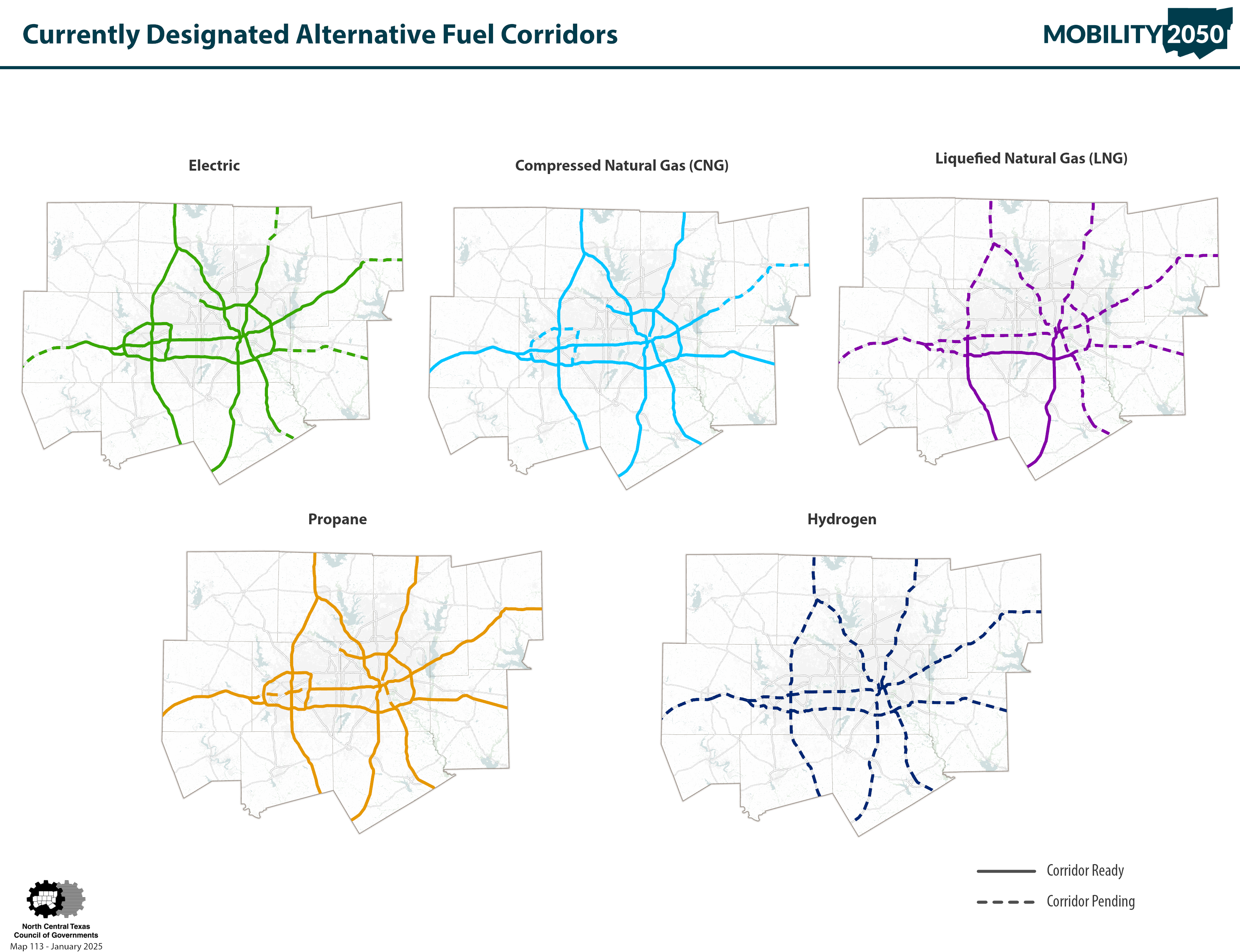Alternative Fuel Corridors
Through the Federal Highway Administration’s Alternative Fuel Corridor Program, every interstate in Texas, and several other key highways, have been designated as alternative fuel corridors. Corridor designation means that a driver could travel that roadway in the designated alternative fuel vehicle and be confident that refueling facilities for that fuel are available (e.g., electric charging stations are available on electric corridors). Designated alternative fuels include electricity, hydrogen, compressed natural gas, liquified natural gas, and propane (LPG). NCTCOG/Dallas-Fort Worth Clean Cities (DFWCC) has been deeply engaged in expanding alternative fuel usage in Texas.
NCTCOG/DFWCC initiatives involving alternative fuel corridors since 2016 include:
Current and Ongoing
- National Alternative Fuel Corridor Council: DFWCC participates in this effort to coordinate across state lines and support implementation of signage.
- National Electric Vehicle Infrastructure (NEVI) Formula Program/Texas EV Charging Plan: Staff is coordinating closely with the Texas Department of Transportation (TxDOT) to implement this program in Texas. NEVI guidelines and funding are tied to electric vehicle corridor designations established through the Alternative Fuel Corridors Program.
- Implementation of the IH 45 Corridor Zero Emission Vehicle Plan: Staff hopes to move plan recommendations to reality and are seeking partners and resources to advance projects. Contact cleancities@nctcog.org for more information.
Past and Recent
- IH 45 Corridor Zero Emission Vehicle Plan (published August 2022): Staff developed this plan recommending placement of electric charging and hydrogen fueling infrastructure along Interstate 45 with heavy stakeholder input. The plan has a focus on enabling medium- and heavy-duty zero-emissions vehicles, especially in the freight sector.
- South Central Alternative Fuel Corridor Convening: DFWCC co-hosted this workshop-style event that allowed for coordination and discussion among stakeholders in Texas, Louisiana, Arkansas, and Oklahoma. This event was sponsored by the Federal Highway Administration.
- Comments on the Proposal Manual of Uniform Traffic Control Devices: NCTCOG provided recommendations for standardized corridor identification, general service, and specific service signs across all alternative fuel corridors.
- Corridor Nominations: NCTCOG/DFWCC has made recommendations for corridor designation since the initial nomination cycle in 2016. In the first nomination round, NCTCOG/DFWCC submitted the most extensive nomination packet from the State of Texas, nominating a network of interstates that encompassed the entire state. Since then, TxDOT has had primary responsibility for submittals, and staff has provided input for TxDOT consideration. For the full list of designated highways, visit this Federal Highway Administration (FHWA) website and scroll down to Texas.

Background & Current Highway Designations
The U.S. Department of Transportation, under Title 23 U.S. Code Section 151, is required to designate national corridors for EV charging and hydrogen, propane, and natural gas fueling. This program, known as the Alternative Fuel Corridors Program, is led by the FHWA which works with other federal, state, and local officials (such as NCTCOG and DFWCC) and private industry to help plan and promote National Highway System corridors. This program was first established under the FAST Act and expanded by the Infrastructure Investment and Jobs Act (Public Law 117-58, also known as the Bipartisan Infrastructure Law), which provides further guidance and funding for alternative fuel corridors, particularly for electric vehicles.
One of two designations is used for each nominated highway segment: corridor-ready and corridor-pending. Corridor-ready is reserved for sections of highway that meet all corridor standards, while corridor-pending is for sections that have some infrastructure and meet some standards. Criteria for corridor-ready and corridor-pending National Highway System segments for each alternative fuel type can be found in the 2024 Request for Nominations on the FHWA Alternative Fuel Corridors page. After TxDOT submits corridor nominations, FHWA reviews the nomination materials and issues designations. FHWA has completed eight rounds of Alternative Fuels Corridor Designations from 2016-2024. The round 8 Request for Nominations closed June 14, 2024, and nominations were announced October 1, 2024. In Round 7, FHWA also began accepted nominations for Freight Electric Vehicle Corridor designations using the National Highway Freight Network as a preliminary designation framework.
Texas Designations:
- 21 Interstate Highways
- 2 U.S. Highways
- 1 State Highway
National Designations:
- 125+ nominations from state and local officials
- Segments or entire lengths of 138 interstate corridors and 181 U.S. highways and state roads
- All 50 states, the District of Columbia, American Samoa, Commonwealth of Northern Mariana Islands, Guam, and Puerto Rico designated as corridor-ready or corridor-pending for one or more alternative fuel types
Further Resources
- Alternative Fuel Toolkit - can be used to learn about alternative fuels and infrastructure, plan infrastructure funding, and act using alternative fuel vehicle guides and information provided by the FHWA.
- Alternative Fueling Station Locator - provides data on alternative fuel stations in the United States and Canada. This tool has many functionalities and can help drivers plan a trip based on available fueling infrastructure. It can also help communities plan for additional alternative fuel infrastructure.
- Alternative Fuels Data Center - contains extensive information about alternative fuels, alternative fuel vehicles, and laws and incentives as well as maps, data, and publications on numerous alternative fuel subjects.
- TxDOT Alternative Fuel Station Signage Policy - outlines the current guidance on posting signage for alternative fuel facilities in Texas.
- Manual on Uniform Traffic Control Devices - updated version of Federal guidance on highway signage, including additions for alternative fuel signage.
- DFW Clean Cities Initiatives - learn about other ongoing projects.
- Rider 48 Evaluation of Medium-Duty and Heavy-Duty Vehicle Charging Infrastructure and Capacity - TxDOT evaluates the current landscape and future potential of medium and heavy-duty vehicle charging infrastructure in Texas.
- National Zero-Emission Freight Corridor Strategy - the Joint Office of Energy and Transportation's plan for creating ubiquitous and convenient access to electric vehicle charging and hydrogen refueling along the nation’s freight corridors.
